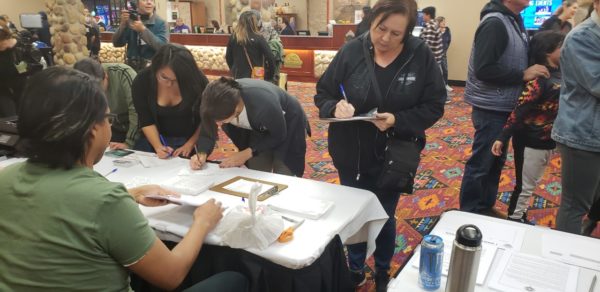
- Details
- By Levi Rickert
WASHINGTON — The two co-chairs of the Congressional Native American Caucus, Rep. Tom Cole (R-OK), a tribal citizen of the Chickasaw Nation of Oklahoma, and Rep. Sharice Davids (D-KS), a tribal citizen of the Ho-Chunk Nation, joined to introduce the Frank Harrison, Elizabeth Peratrovich, and Miguel Trujillo Native American Voting Rights Act of 2021 (NAVRA).
The legislation will protect the sacred right to vote and ensure equal access to the electoral process for Native Americans.
NAVRA would enact key measures, such as allowing Tribes to specify the number and locations of requested voter registration sites, drop boxes and polling locations on Tribal lands, and authorizing Tribal ID cards for voting purposes. The bill would also help establish state-level Native American voting task forces to address the unique voting issues faced by voters on Tribal lands by authorizing a $10 million Native American Voting Rights Task Force grant program. It would also require prior Tribal notice and consent before States and precincts could remove, consolidate, or otherwise reduce access to voting locations on Tribal lands.
Companion legislation was introduced by U.S. Senator Ben Ray Luján (D-N.M.), who previously led the House re-introduction of NAVRA during the 116th Congress.
“Alongside my colleagues Representative Davids and Senator Lujan, I am proud to introduce the Native American Voting Rights Act,” Rep. Cole (OK-0 said “This legislation greatly improves the tools and resources available to help Native Americans exercise their right to vote, which is especially important for those living in rural areas.”
The United States has a trust responsibility to enact voting rights legislation to protect the constitutionally-guaranteed right of Native Americans to vote. However, Native American voters have historically faced unique challenges when exercising their right to vote, according to Rep. Davids.
“Voting is the very foundation of our democracy, yet Native voters face repeated barriers at the ballot box, from considerable distance and unequal operating hours at polling places to lack of voter education. This bill further fulfills our federal trust responsibility to protect and promote Native Americans’ exercise of their constitutionally guaranteed right to vote,” Rep. Davids said.
During the past decade, the Native American Rights Fund (NARF) has documented and fought against the targeted, present day obstacles that Native voters face when trying to cast a ballot.
“Native Americans face unique challenges to vote and have continually fought against discriminatory tactics. The Native American Voting Rights Act would create the means to begin to address these extensively documented obstacles and prevent voter suppression and disenfranchising tactics from silencing the voices of Native American voters,” John Echohawk (Pawnee), Native American Rights Fund executive director told Native News Online.
The news of the introduction of the NAVRA in Congress comes after the U.S. Supreme ruled on the Brnovich v. Democratic National Committee case on July 1, 2021 that overturned two Arizona laws that were deemed as restrictive against the Native vote in the state.
“With the recent the U.S. Supreme Court ruling on the Brnovich versus DNC that was a lethal blow to Indian Country, the introduction of the Native American Voting Rights Act introduced by U.S. House Representatives Cole and Davids will give Indian County hope in equal participation at the ballot box,” O.J. Seamon (Rosebud Sioux), founder of Four Directions Native Vote, said to Native News Online on Monday afternoon.
For Tom Rodgers (Blackfeet Nation), president of the Global Indigenous Council, the new legislation is necessary to ensure that Native Americans, who were the last U.S. citizens to get the right to vote.
RELATED: Congress Needs to Pass the Native American Voting Rights Act
“We will not allow these cultural clear cutters to take it away and be removed to a racist reservation that exists in their mind,” Rodgers said. “The Indian Wars of years gone by are no longer fought with smallpox, or demon rum, or post-Civil War cavalry with names such as Custer, Sheridan, Doane, or Baker, rather they come cloaked in judicial black robes armed with a voting rights philosophy as flawed as the Manifest Destiny.”
The legislation is endorsed by the National Congress of American Indians, Native American Rights Fund (NARF), Native American Voting Rights Coalition, Alaska Federation of Natives, among over a dozen other American Indian organizations.
More Stories Like This
Native News Weekly (August 25, 2024): D.C. BriefsMonday Morning: (February 16, 2026): Articles You May Have Missed This Past Weekend
US Presidents in Their Own Words Concerning American Indians
Osage Nation Mourns the Passing of Former Principal Chief Jim Gray
Native News Weekly (February 15, 2026): D.C. Briefs
Help us defend tribal sovereignty.
At Native News Online, our mission is rooted in telling the stories that strengthen sovereignty and uplift Indigenous voices — not just at year’s end, but every single day.
Because of your generosity last year, we were able to keep our reporters on the ground in tribal communities, at national gatherings and in the halls of Congress — covering the issues that matter most to Indian Country: sovereignty, culture, education, health and economic opportunity.
That support sustained us through a tough year in 2025. Now, as we look to the year ahead, we need your help right now to ensure warrior journalism remains strong — reporting that defends tribal sovereignty, amplifies Native truth, and holds power accountable.
 The stakes couldn't be higher. Your support keeps Native voices heard, Native stories told and Native sovereignty defended.
The stakes couldn't be higher. Your support keeps Native voices heard, Native stories told and Native sovereignty defended.
Stand with Warrior Journalism today.
Levi Rickert (Potawatomi), Editor & Publisher

